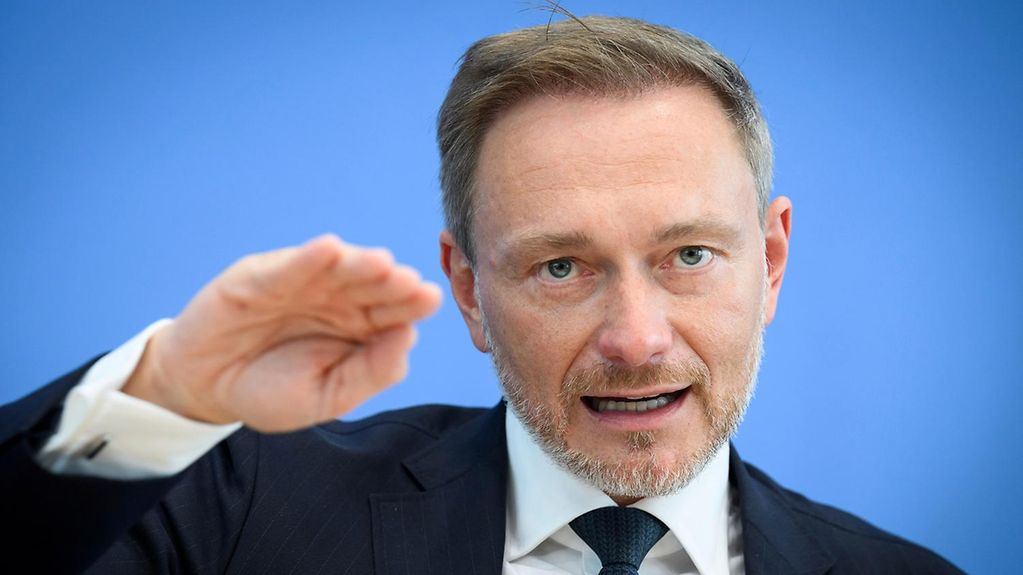Federal Cabinet adopts 2024 federal budget
The federal budget for 2024 and the finance plan up to 2027 have been drawn up. “Following a number of years of crises, very high spending and debt, we are now continuing on the path towards normality: with the debt limit in place and record-level investment, but with no tax increases,” Finance Minister Lindner stressed. Read our list of important questions and answers here.
4 min reading time

Federal Finance Minister Christian Lindner presenting the government draft for the 2024 federal budget.
Photo: picture alliance/dpa
“Today we have adopted a draft budget in which the reality of the financial situation is taken into account,” said Federal Finance Minister Christian Lindner as he presented the 2024 federal budget on Wednesday. “This marks the end of crisis mode and expansive public finance,” he pointed out, adding that this was not only stipulated in the constitution but also an expression of economic wisdom and a sense of responsibility towards future generations.
What does the 2024 federal budget look like?
The budget reflects financial policy for these changing times: Russia continues its war against Ukraine. High inflation and the rise in interest rates have solidified, and the effects of the COVID-19 pandemic can still be felt. Other major challenges facing Germany include climate change, digitalisation and demographic development.
One thing is certain, nevertheless: any money spent by the government must first be earned, which is why Germany will be taking a vital step back towards fiscal normality in 2024, following a number of years with very high spending. The 2024 federal budget provides for revenues and expenditures of 445.7 billion euros, just under 31 billion euros less than the current year’s budget. Germany is therefore observing the regular debt limit by significantly reducing new debt, while making high investments at the same time.
What are the priorities of the Federal Government?
The Federal Government resolutely responds to the most pressing challenges and provides large sums of money, among other things for securing future peace and prosperity. The following focus areas were determined to this end: The Federal Government promotes social cohesion, security and defence, and continues to pursue the transition towards a climate-neutral economy.
By introducing the citizen’s income and the housing benefit reform, the Federal Government has realised two key initiatives in order to protect the dignity of individuals, promote social participation and to ensure appropriate housing that is suitable for families. Planning provides for various family benefits to be pooled in the basic child allowance, to enable easier access to such benefits and ensure more effective support for children and teenagers who are threatened by poverty.
The Federal Government also intends to strengthen the areas of external security and defence, in order to safeguard peace and stability. Germany’s security is inseparably linked to the security of the country’s allies and European partners. Using the federal budget and the Federal Armed Forces special funding package, Germany will contribute its two-percent contribution for NATO’s goals from next year onwards. Furthermore, the Federal Government acknowledges its international responsibilities in development cooperation.
Substantial funds are also earmarked for securing and gradually transforming the energy supply system, for example by building liquid gas terminals that will reduce Germany’s dependency on individual energy suppliers. Further important aspect for reaching energy and climate policy goals include energy-focused building refurbishments, reducing industrial carbon emissions and further development of electric mobility, charging infrastructure, renewable energy and the hydrogen economy.
How much money is allocated for investments?
The coalition agreement provides for some key investments into the country’s future to be made over the next few years, especially in the areas of digitalisation, mobility, education and research. Investment spending is going to remain on a high level, despite the restrictive budget and financial policy. More than 54 billion euros are to be invested in 2024 alone: 40 percent more than before the COVID-19 crisis. Planning provides for a further increase of funds over the coming years, to 57.2 billion euros in 2027.
How will new debt change?
The regular debt limit that is enshrined in the Basic Law will be complied with next year and throughout the entire period of the finance plan. Net borrowing will be significantly reduced in 2024 compared to the previous year, dropping from almost 45.6 billion euros to around 16.6 billion euros. This is to go down even further over the next few years: the Federal Government plans to borrow no more than 15 billion euros in 2027.
To be able to achieve this, overall spending must be reduced every year compared to the current budget year. This restrictive fiscal policy is meant to curb inflation and to ensure the Federal Government's budgetary scope for action. “In this sense I do not consider the 2024 draft budget a conclusion but a starting point for further efforts,” Lindner continued.
What will happen next?
The budget and finance plan will now go to the German Bundestag and Bundesrat for approval. Concepts may be changed further in the subsequent parliamentary consultations. Once the Bundestag has adopted the budget and it has been signed off by the Federal President, the federal budget will enter into effect as a law.